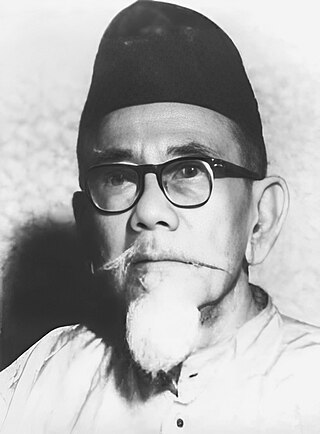
Semaun, also spelled Semaoen, was the first chairman of the Communist Party of Indonesia (PKI) and was a leader of the Semarang branch of the Sarekat Islam.

Sarekat Islam or Syarikat Islam was an Indonesian socio-political organization founded at the beginning of the 20th century during the Dutch colonial era. Initially, SI served as a cooperative of Muslim Javanese batik traders to compete with the Chinese-Indonesian big traders. From there, SI rapidly evolved into a nationalist political organization that demanded self-governance against the Dutch colonial regime and gained wide popular support. SI was especially active during the 1910s and the early 1920s. By 1916, it claimed 80 branches with a total membership of around 350,000.

HajiAgus Salim was an Indonesian journalist, diplomat, and statesman. He served as Indonesia's Minister of Foreign Affairs between 1947 and 1949.
Insulinde (1913–1919), a direct successor of the Indische Party (IP) and later renamed the Nationale Indische Party (NIP), was a political organization that represented efforts by some Indo Eurasians to identify and cooperate with the Indigenous educated élite of the Dutch East Indies in an effort to establish an independent dominion. The organisation was mainly led by Indo-European and Javanese activists, but had a considerable membership in the South Moluccas. It was considered part of the more radical political wing in the colony, for which it faced much oppression from the colonial authorities.

Marco Kartodikromo, also known by his pen name Mas Marco, was an Indonesian journalist and writer.

Student Hidjo is a 1918 novel by Marco Kartodikromo. Originally published as a serial in the newspaper Sinar Hindia, it was republished in book form in 1919 by Masman & Stroink.
Sinar is a Swiss photographic equipment manufacturer.

Djawa Tengah was a major Malay-language peranakan Chinese daily newspaper in Semarang, Dutch East Indies from 1909 to 1938. It is said to have been the first Chinese newspaper in Semarang.

Tjhoen Tjhioe was a Malay language Peranakan Chinese newspaper from Surabaya, Dutch East Indies catering mainly to the Chinese population. The full title of the paper was Tjhoen Tjhioe: Soerat kabar dagang bahasa Melajoe jang moeat roepa kabar penting bagi bangsa Tionghoa. Although the paper only existed for a short time, during that time it was recognized as one of the top Chinese newspapers in the Indies, alongside Sin Po and Perniagaan.
Sie Hian Ling, who sometimes signed his works H.L. Sie, was a Peranakan Chinese journalist from Semarang, Dutch East Indies. He was one of the first Chinese journalists in the Indies and an early translator of Chinese novels.
The 1918 Kudus riot was an anti-Chinese riot that took place in the city of Kudus, Semarang Regency, Dutch East Indies, on October 31, 1918. In the riot, Javanese townspeople burned and looted the Chinese district, resulting in roughly 10 deaths and dozens of injuries, and causing half of the Chinese population of the city to flee to Semarang and other cities in Java.

Neratja, later Hindia Baroe, was a Malay language newspaper printed from 1917 to 1926 in Weltevreden, Dutch East Indies. Although originally founded with government support to be a Malay voice for the Dutch Ethical Policy, before long it became associated with the Sarekat Islam and the Indonesian National Awakening. Among its editors were important figures of the Indonesian national movement such as Abdul Muis and Agus Salim.
Parada Harahap was an important journalist and writer from the late colonial period and early independence era in Indonesia. In the 1930s, he was called the "king of the Java press". He pioneered a new kind of politically neutral Malay language newspaper in the 1930s which would cater to the rising middle class of the Indies.
Raden Darsono Notosudirdjo, more commonly known simply as Darsono, was a journalist and editor of Sinar Hindia, an activist in the Sarekat Islam and chairman of the Indonesian Communist Party from 1920 to 1925.

Adolf Baars was a Dutch-Jewish Communist, engineer, and writer who is largely remembered today for his early role in the Indische Sociaal-Democratische Vereeniging and the Indonesian Communist Party.
Soetitah was a Sarekat Islam and Communist Party of Indonesia (PKI) propagandist, activist, and schoolteacher in Semarang, Dutch East Indies in the 1910s and 1920s. She was a close ally of Semaun, Tan Malaka, and other Semarang communists of the time and was chair of the women's section of the party in the early 1920s. She was exiled by the Dutch to the Boven-Digoel concentration camp from 1927 to 1930.
Moenasiah was a Sarekat Islam and Indonesian Communist Party leader active in Semarang, Central Java, Dutch East Indies during the 1920s. She was chairperson of the women's section of the Communist Party for a time in the 1920s. She was exiled by Dutch authorities to Boven-Digoel concentration camp from 1927 to 1930.

Phoa Tjoen Hoay, who sometimes published as T. H. Phoa Jr., was a Chinese Indonesian, Malay language journalist, translator, and newspaper editor active in the Dutch East Indies in the early twentieth century. He translated a number of Chinese and European works into Malay, including seven volumes of Sherlock Holmes by Arthur Conan Doyle.

Sinar Sumatra was a Malay-language newspaper published in Padang, Dutch East Indies from 1905 to around 1941 or 1942. It is generally considered a Peranakan Chinese publication, although it had European publishers and Minangkabau editors as well. During the pre-World War II period it was one of the most widely-read Malay language newspapers in Sumatra.

Kho Tjoen Wan, sometimes spelled Kho Tjoen Gwan, was a Chinese Indonesian journalist, writer and political activist active mainly from the 1910s to the 1930s in the Dutch East Indies. He was involved with the Communist Party of Indonesia in the 1920s and may have been its first ethnically Chinese executive member.












